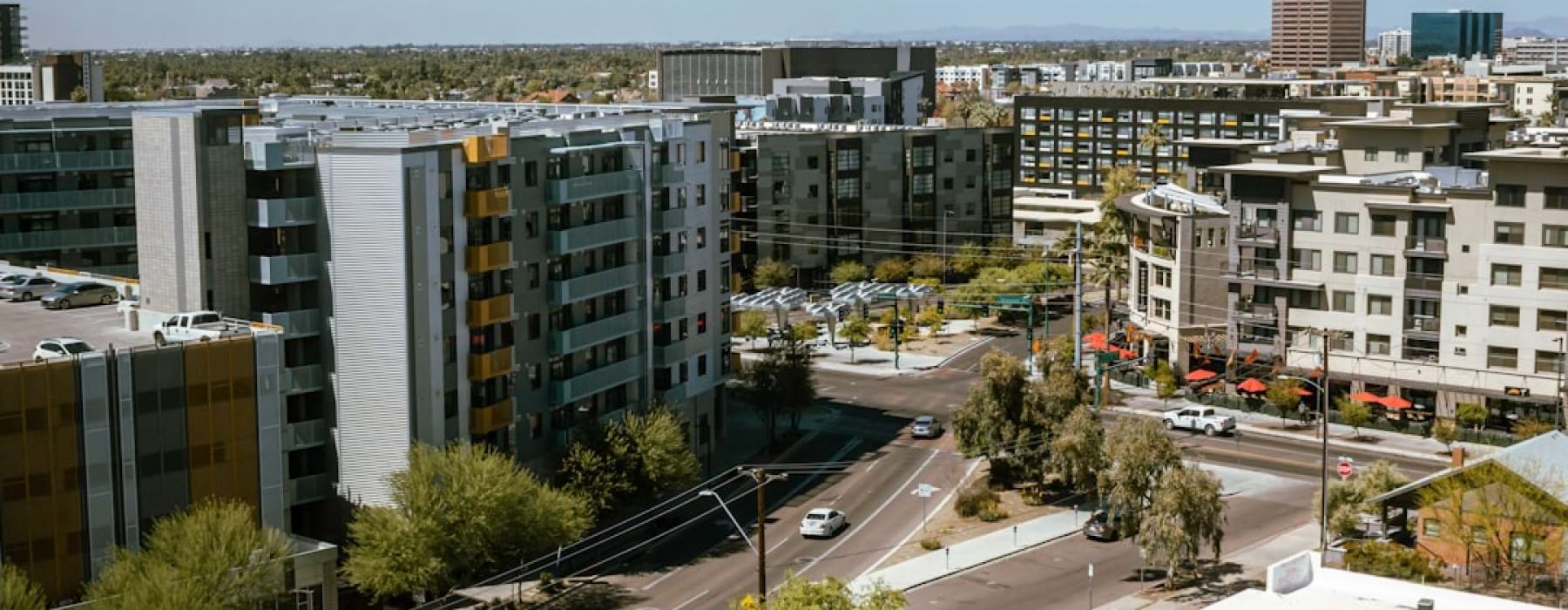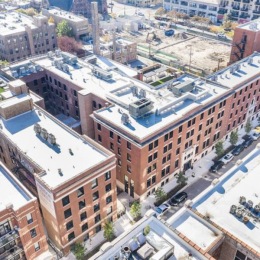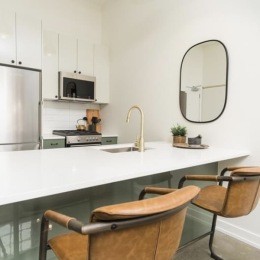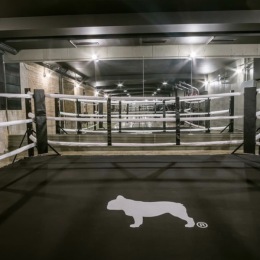Understanding Your Options: Condos vs. Apartments in Today's Rental Market
Condos for rent offer a unique alternative to traditional apartment living, combining the convenience of renting with the character of individually owned homes. Whether you're considering a sleek downtown unit or a beachfront property, understanding the key differences can help you make the right choice.
Quick Answer: What Are Condos for Rent?
- Ownership: Individual units owned by separate people who rent them out
- Management: Varies by owner (some professional, some individual landlords)
- Character: Each unit often has unique finishes and layouts
- Rules: Subject to both lease terms and HOA regulations
- Amenities: Mix of building amenities plus individual owner upgrades
The rental market offers two main housing types that often get confused. Research from major rental platforms shows thousands of available units in popular markets like Orlando, Panama City Beach, and Tampa, with varying features and management styles.
Condos are individually owned units within a building or complex. When you rent a condo, you're renting directly from the owner who purchased that specific unit. This means each condo can have different layouts, finishes, and even rental policies within the same building.
Apartments, on the other hand, are typically owned by a single entity - whether that's a property management company, real estate investment firm, or apartment complex owner. This creates a more standardized experience across all units.
The choice between these options affects everything from your application process to how maintenance requests get handled. As one industry insight notes: "Units in the same building may have different features and layouts because they are often rented by individual owners."
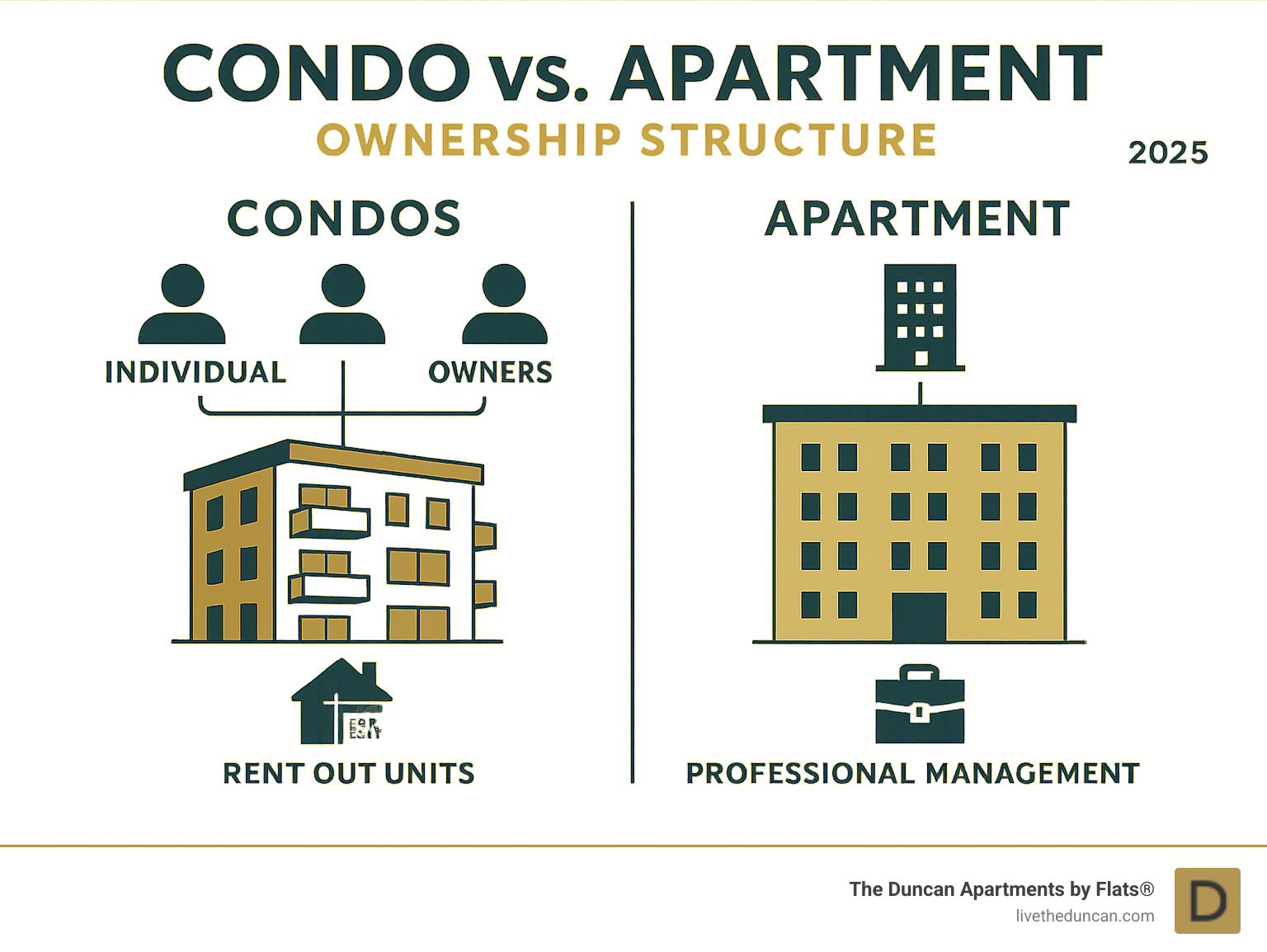
What is a Condo? The Ownership Difference
Think of condos for rent as the middle ground between apartment living and homeownership. Each unit in a condo building is owned by an individual person, just like houses on a street. The key difference? These individual owners choose to rent out their units rather than live in them themselves.
This individual ownership creates a fascinating dynamic. While the building might look uniform from the outside, step inside different units and you'll find a world of variety. One owner might have splurged on marble countertops and custom lighting, while their neighbor prefers cozy hardwood floors and vintage fixtures.
The Homeowners Association (HOA) plays a crucial role in condo living. Think of it as the community's governing body, made up of unit owners who set rules for shared spaces and maintain building standards. Whether you're renting or own your unit, you'll need to follow HOA guidelines on everything from pet policies to balcony decorations.
What makes condos for rent particularly interesting is their unique interiors. Since each owner treats their unit as a personal investment, you'll often find upgrades and personal touches that reflect individual taste. One unit might feature a chef's kitchen with stainless steel appliances, while another showcases exposed brick walls and artistic lighting.
This individual ownership also means varied management approaches. Some owners hire professional property management companies to handle everything from tenant screening to maintenance requests. Others prefer a hands-on approach, managing their rental property themselves. This can lead to different experiences even within the same building.
For those considering condos for rent as a property investment, the appeal is clear. Owners can customize their units to attract quality tenants while building equity in real estate. This investment mindset often translates into better-maintained properties with thoughtful upgrades.
The Pros of Renting a Condo
Choosing condos for rent opens the door to a more personalized rental experience that's hard to find elsewhere.
The unique character of condo living stands out immediately. Unlike cookie-cutter apartment layouts, each condo tells its own story through the owner's design choices. You might find a unit with custom built-ins, upgraded bathroom fixtures, or a kitchen island that transforms the entire living space. This individuality means you're not just renting a place to live – you're renting someone's carefully curated home.
Direct landlord communication can be refreshing after dealing with large property management companies. When you rent from an individual owner, you often get their personal phone number and can discuss concerns directly. This relationship can lead to quicker responses and more flexible solutions to minor issues.
The high-end finishes found in many condos for rent reflect the owner's investment in their property. Since they view their unit as a long-term asset, owners frequently install quality materials like granite countertops, hardwood-style flooring, and high-performance appliances. These upgrades create a more luxurious living experience, often distinct from a standard apartment complex.
There's also potential for negotiation that you won't find with corporate-owned properties. Individual owners might be flexible about lease start dates, allow minor modifications, or work with you on specific needs. While this isn't guaranteed, the personal nature of the relationship often opens doors that remain closed in more formal rental arrangements.
The Cons of Renting a Condo
While condos for rent offer unique advantages, they also come with some challenges worth considering.
HOA rules can feel restrictive if you're used to apartment living. These regulations might limit your pet options, restrict balcony decorations, or set specific quiet hours. While designed to maintain community standards, HOA rules apply to all residents regardless of whether you rent or own. Some associations have strict policies about guest parking or even holiday decorations that might surprise new renters.
Inconsistent management creates uncertainty in your rental experience. If your landlord manages the property themselves, their availability might be limited during emergencies or busy periods. Unlike apartment complexes with 24/7 maintenance teams, individual owners might take longer to address issues or coordinate repairs. This is especially noticeable for problems requiring specialized contractors or HOA approval.
Maintenance delays can occur when your individual owner lacks the resources or relationships that professional property management companies maintain. While common area issues fall under HOA responsibility, anything inside your unit depends entirely on your landlord's responsiveness and budget.
Potential landlord issues arise from the personal nature of individual ownership. Without the formal policies and dispute resolution procedures that apartment complexes provide, disagreements can become more complicated. Some individual owners might have unrealistic expectations or lack experience in tenant relations, creating friction that's harder to resolve through official channels.
What is an Apartment? The Community Experience
When you step away from condos for rent and explore traditional apartment living, you're entering a completely different world of rental housing. Apartments operate under a single ownership structure, where one entity owns the entire building or complex. This could be a property management company, a real estate investment firm, or even a large corporation that specializes in rental housing.

The beauty of this setup lies in its professional management approach. Walk into most apartment communities and you'll find a dedicated leasing office staffed with people whose job is to make your rental experience smooth and consistent. These aren't individual owners juggling rental properties alongside their day jobs – they're trained professionals who handle everything from touring units to processing applications and coordinating maintenance requests.
Standardized units are another hallmark of apartment living. While a condo building might have units with wildly different kitchen styles or flooring choices, apartments typically maintain consistency throughout the property. You might find studio, one-bedroom, two-bedroom, and three-bedroom options (such as those offered at The Duncan in Chicago's West Loop), but the finishes, appliances, and overall aesthetic remain uniform from unit to unit.
This standardization extends to the community amenities as well. Apartment complexes are designed from the ground up to offer shared spaces that improve residents' lifestyles. Think fitness centers with the latest equipment, sparkling swimming pools, rooftop lounges perfect for entertaining, and co-working spaces for remote workers. These amenities are professionally maintained and managed, ensuring they're always ready when you want to use them.
The Pros of Renting an Apartment
The apartment lifestyle brings several compelling advantages that can make your daily life significantly easier and more enjoyable.
Professional maintenance and service stands out as perhaps the biggest benefit. When your dishwasher starts acting up or your air conditioning decides to take a summer vacation, you're not left wondering if your landlord will get back to you. Apartment communities typically have dedicated maintenance teams who respond quickly to requests, often offering 24/7 emergency service for urgent issues. This level of reliability can be incredibly reassuring.
The consistent experience and clear policies create a sense of predictability that many renters appreciate. From the moment you submit your application to the day you move out, the process follows established procedures. Lease terms are standardized, community rules are clearly outlined, and everyone receives the same level of service. There's comfort in knowing exactly what to expect.
Community amenities in apartment complexes often rival those of luxury hotels. Modern communities offer everything from rooftop lounges with city views to state-of-the-art fitness centers, swimming pools, grilling stations, and even dog runs for your furry friends. At The Duncan, for instance, residents enjoy luxury amenities like an indoor pool and rooftop lounge that create opportunities for both relaxation and socializing.
The standardized lease process removes much of the guesswork from renting. Leasing offices guide you through each step, ensuring all background checks, credit checks, and documentation are handled efficiently. This structured approach can make what's often a stressful process feel much more manageable.
The Cons of Renting an Apartment
While apartment living offers many conveniences, it's worth considering a few potential drawbacks that might influence your decision.
Less unique character and standard finishes can make apartment living feel somewhat predictable. Unlike condos for rent where individual owners might have installed unique tile work or custom lighting, apartment units typically feature the same finishes throughout the building. While these are often modern and functional, they don't offer the personal touches or character that some renters crave.
Limited negotiation opportunities come with the professional management territory. Large management companies operate with established policies, leaving little room for individual requests. Asking for specific modifications to your unit or lease terms often isn't an option, as procedures are standardized across the property.
Corporate policies, while ensuring consistency, can sometimes feel rigid. Decisions about everything from pet policies to amenity usage are made at the corporate level, which means less flexibility for unique situations or personal preferences. The trade-off for professional service is often a more formal, less personal relationship with your housing provider.
Key Differences at a Glance: Condo vs. Apartment
Now that we've explored both options in detail, let's break down the key distinctions between condos for rent and apartments in a way that makes your decision clearer.
The most fundamental difference lies in ownership structure. When you're looking at condos for rent, you're dealing with individual unit owners who've purchased their specific homes within a building or complex. Think of it like a neighborhood of houses, except they're stacked vertically. Apartments, on the other hand, operate under single entity ownership - whether that's a corporation, investment firm, or property management company that owns the entire building.
This ownership difference creates a ripple effect that touches every aspect of your rental experience. Management styles vary significantly between the two. Condo management can be a mixed bag - some owners hire professional property managers, while others handle everything themselves. This means your experience might range from highly professional to more personal and informal. Apartment communities typically offer professional management with on-site staff, creating a consistent experience across the board.
When it comes to amenities and maintenance, the contrast becomes even clearer. Condos for rent feature common areas managed by the HOA, while individual unit upgrades depend entirely on what each owner has invested in their property. You might find one condo with a stunning renovated kitchen and another with basic finishes, all within the same building. Apartments maintain consistency - amenities are professionally managed and maintained, and you can expect similar finishes across all units.
Maintenance response tells another important story. In condos, owners handle in-unit issues while the HOA manages common areas, which can lead to varying response times depending on your landlord's availability. Apartment communities typically have dedicated maintenance staff ready to address issues quickly and professionally.
The individuality factor might be the deciding element for many renters. Condos for rent offer a high degree of variation in finishes, layouts, and personal touches that reflect each owner's style and investment. Apartments provide standardized layouts and finishes that create a cohesive, predictable living environment.
Finally, rules and regulations operate differently in each setting. Condo living means navigating both your lease terms set by the owner plus HOA rules that govern the community - which can sometimes feel complex. Apartment living typically involves straightforward lease terms and community rules set by management, creating a more streamlined experience.
Understanding these differences helps you determine which option aligns better with your lifestyle preferences and rental priorities.
Exploring Features and Amenities in Condos for Rent
When searching for condos for rent, you'll find a wonderful mix of features that blend personal touches with community perks. The beauty of condo living lies in this combination - each unit reflects its owner's taste and investment, while shared spaces bring neighbors together.

Inside your potential new home, you'll often find thoughtful upgrades that make daily life more enjoyable. In-unit laundry is a game-changer - no more hauling baskets to a communal room or scheduling your life around shared machines. Many condos feature private balconies where you can sip your morning coffee while watching the world wake up, or unwind with a glass of wine as the sun sets.
The kitchen often becomes the heart of these homes, with owners frequently investing in updated appliances like stainless steel refrigerators and dishwashers. You might find beautiful granite countertops that make meal prep feel less like a chore and more like cooking in a magazine-worthy space. Hardwood floors are another popular upgrade, creating a warm, sophisticated feel that's also practical for busy lifestyles.
Beyond your front door, condo communities offer shared amenities that improve your living experience. Community pools provide a refreshing escape during hot summer days, while fitness centers make it easy to stick to your workout routine. Gated access and covered parking add layers of convenience and security that busy professionals appreciate.
The specific amenities can vary dramatically depending on location. In coastal areas like Clearwater or Saint Petersburg, the lifestyle revolves around water access and outdoor living. Urban condos might focus more on modern conveniences and city views.
What to Look for in Condos for Rent
Finding the perfect condo means identifying features that match your daily routine and long-term happiness.
Water views can transform your living experience, especially in coastal markets. There's something magical about watching boats drift by or seeing the sun dance on the water from your own window. Private balconies extend your living space outdoors, creating a personal retreat where you can read, work, or simply breathe.
Updated kitchens with modern appliances make cooking more enjoyable and entertaining easier. Look for granite or quartz countertops that provide both beauty and durability, along with stainless steel appliances that offer reliability and style. In-unit laundry facilities might seem like a small detail, but they'll save you countless hours and make your weekly routine much smoother.
What to Expect from Apartment Amenities
Apartment communities take a different approach to amenities, focusing on professionally managed spaces that serve the entire community. These amenities are maintained by dedicated staff, ensuring they're always ready when you need them.
Rooftop lounges have become the crown jewel of modern apartment living, offering stunning city views and social spaces for residents. Many include grilling stations where neighbors gather for impromptu barbecues and weekend celebrations. State-of-the-art fitness centers provide a convenient alternative to off-site gyms, often featuring everything from cardio equipment to free weights and yoga spaces.
Swimming pools provide year-round recreation, whether they're outdoor oases for summer fun or indoor facilities for four-season enjoyment. Pet-friendly features like dog runs and pet washing stations show that communities understand your furry family members matter too. Co-working spaces have become essential in our remote-work world, offering quiet spots for video calls and productive work sessions.
These amenities create a lifestyle where convenience meets community, making it easy to stay active, socialize, and enjoy your downtime without leaving home.
The Rental Process: What to Expect
Whether you're pursuing condos for rent or traditional apartments, the rental process generally involves several key steps. Being prepared can make the experience much smoother.

- Application: You'll start by submitting a rental application. This form gathers your personal information, employment history, and previous rental references.
- Credit Check: Landlords and property managers typically conduct a credit check to assess your history of meeting financial obligations. This helps them determine your reliability in meeting lease obligations.
- Background Check: A background check is common to verify your identity and review any criminal history.
- Security Deposit: Once your application is approved, a security deposit is typically required. This deposit is held by the landlord or property manager to cover any potential damages beyond normal wear and tear. It is usually refundable at the end of the lease, contingent on the unit's condition.
- Lease Terms: You'll sign a lease agreement, which is a legally binding contract outlining the terms of your tenancy. Typical lease terms are 12 months, but some properties might offer shorter or longer periods. For condos for rent, short-term options (e.g., 1-month minimum stays for furnished units) are sometimes available, especially for furnished properties geared towards temporary needs.
- HOA Approval (for Condos): This is a crucial extra step specific to condos. After your owner approves you, the Homeowners Association (HOA) may require their own application and approval process. This often involves an additional background check, interview, or review of the HOA's rules and regulations, which you'll need to acknowledge and agree to. This step can add extra time to your move-in timeline.
Frequently Asked Questions about Condos for Rent
Thinking about renting a condo? Many renters have questions about how the process differs from traditional apartment living. Below are answers to some of the most common inquiries.
Are utilities typically included in condo rentals?
The handling of utilities in condos for rent can vary. In some cases, the responsibility for certain services like water or trash removal may be managed by the owner or HOA. In other cases, the tenant is responsible for establishing and managing all utility accounts, such as electricity, gas, and internet.
It is important to clarify which services you will be responsible for before signing a lease. This information should be detailed in your lease agreement to ensure a clear understanding. In traditional apartments, the process for handling utilities is often more standardized across the property.
Can I find pet-friendly condos for rent?
Absolutely! Pet-friendly condos for rent are definitely out there, but finding them requires a bit more detective work than with apartments. The pet approval process for condos involves two separate problems to clear.
First, the owner must approve your furry friend. Just like any landlord, they'll decide whether they're comfortable renting to pet owners. Second, the HOA rules come into play. The Homeowners Association often has strict guidelines about pets, including restrictions on size, breed, and typically a limit of two pets maximum per unit.
Don't be surprised if you encounter specific requirements like weight limits for dogs or restrictions on certain breeds. Some HOAs are quite particular about maintaining their community standards. When you do find a pet-friendly condo, be prepared for a pet deposit or other specific requirements.
Always confirm both the owner's pet policy and the HOA's rules before getting your heart set on a place. The last thing you want is to fall in love with a condo only to find your pet won't be welcome.
How do I handle maintenance requests in a rented condo?
Understanding maintenance responsibilities in a condo rental is crucial, and it's quite different from the straightforward approach you'd find in a professionally managed apartment complex.
For issues inside your unit - think leaky faucets, broken appliances, or air conditioning problems - you'll contact your individual owner or their property manager. This is where the experience can vary significantly. Some owners work with professional property management companies that respond quickly, while others handle requests themselves and might take longer to address issues.
For common area problems - like issues with the building's pool, elevators, hallways, or exterior lighting - you'll typically need to contact the HOA or the building's management company. These shared spaces fall under the association's responsibility, not your individual owner's.
The response time for maintenance requests can be less predictable than in apartment complexes with dedicated on-site teams. It's smart to ask your owner upfront about their preferred method for maintenance requests and what kind of response time you can expect. Some use online portals, others prefer phone calls or emails.
Getting these contact details and procedures sorted out at the beginning of your lease will save you frustration later when something inevitably needs fixing.
Conclusion: Choosing the Right Home for Your Lifestyle
Deciding between condos for rent and apartments ultimately comes down to personal priorities and lifestyle. If you value unique character, potentially high-end finishes, and a more direct relationship with an individual owner, a condo might be an ideal fit. However, be prepared for the nuances of HOA rules and the varied management styles that come with individual ownership.
On the other hand, if you prioritize professional management, consistent service, a wide array of well-maintained community amenities, and a standardized rental process, then an apartment community could be the perfect home. Properties like The Duncan Apartments in Chicago's West Loop exemplify this approach, offering luxury amenities and a streamlined living experience.

Both options offer distinct advantages. Renters should weigh what matters most to them: the individuality and charm often found in condos, or the consistent convenience and community experience of an apartment. Whatever the choice, the goal is to find the next perfect home. For those looking for apartments with convenient parking options in Chicago, The Duncan offers Chicago apartments with parking garage.
